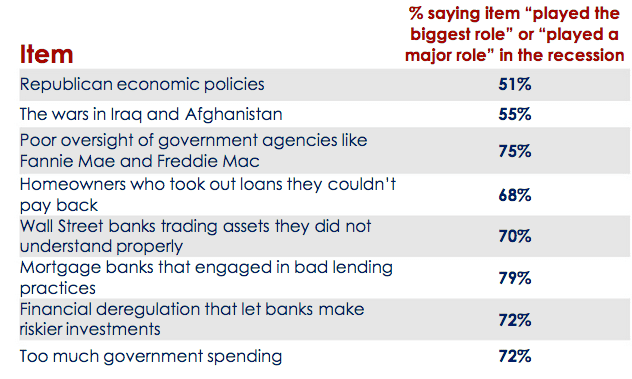
After all the reporting trumpeting the College Republicans’ stock-taking of Millennial voters as “scathing[!!!],” I was a little underwhelmed when I finally read it.
Some parts have the humorously anthropological feel of someone who’s marinaded in beltway groupthink for too long and ventures out to find that Real People share hardly any of the same assumptions, or even language:
… whether or not the government was “too big” was a perplexing question for them. Few had a clear picture of what “big government” meant.
No way!
Some things were legitimately troubling. Only 27 percent considered lowering health care costs a top priority, which is odd for the group that’s being screwed most of all by the ACA. It’s awfully magnanimous, for a generation often accused of being self-obsessed.
On the whole, nearly all the Millennial criticisms of the current GOP are the same as those being made by “libertarian populist” reformers—the party is more friendly to big business than small, too focused on cutting and not enough on fixing. Marginal tax rates don’t turn them on, and they question whether deregulation would actually result in better outcomes for them, at least directly.
Here’s what their survey said about what winnable voters thought about the causes of the recession:
A big point it’s missing is something that Pascal Emmanuel-Gobry says in his reform conservatism “manifesto“:
In other words, the reform conservative story about how government grows goes something like this: Americans increase their demand for big government when they feel enough economic and social insecurity that they see bigger government as the only resort left.
Obamacare is a case in point, here. Americans have always been, and remain, deeply skeptical of socialized medicine, and for extremely good reason. But the cost of health insurance, and the insecurity associated with it, and the dysfunction of the system have become so bad that, in the face of a lack of conservative reform and credible conservative alternatives, they reluctantly accepted it.
The same applies to many Millennial priorities. Most accept at least in theory the idea that higher education subsidies increase the cost of college, but they’re not willing to eliminate them and accept the uncertainty and lack of support that would go along with a return to realistic pricing.
The most concerning long-term threat to small government as far as Millennials are concerned is that they’re likely to be the first generation less economically successful than their parents. It’s certainly possible, some might even say likely, that they’d turn to government to fill that gap. It would have been nice to see the College Republicans reckon with that.
See more from The American Conservative here >
